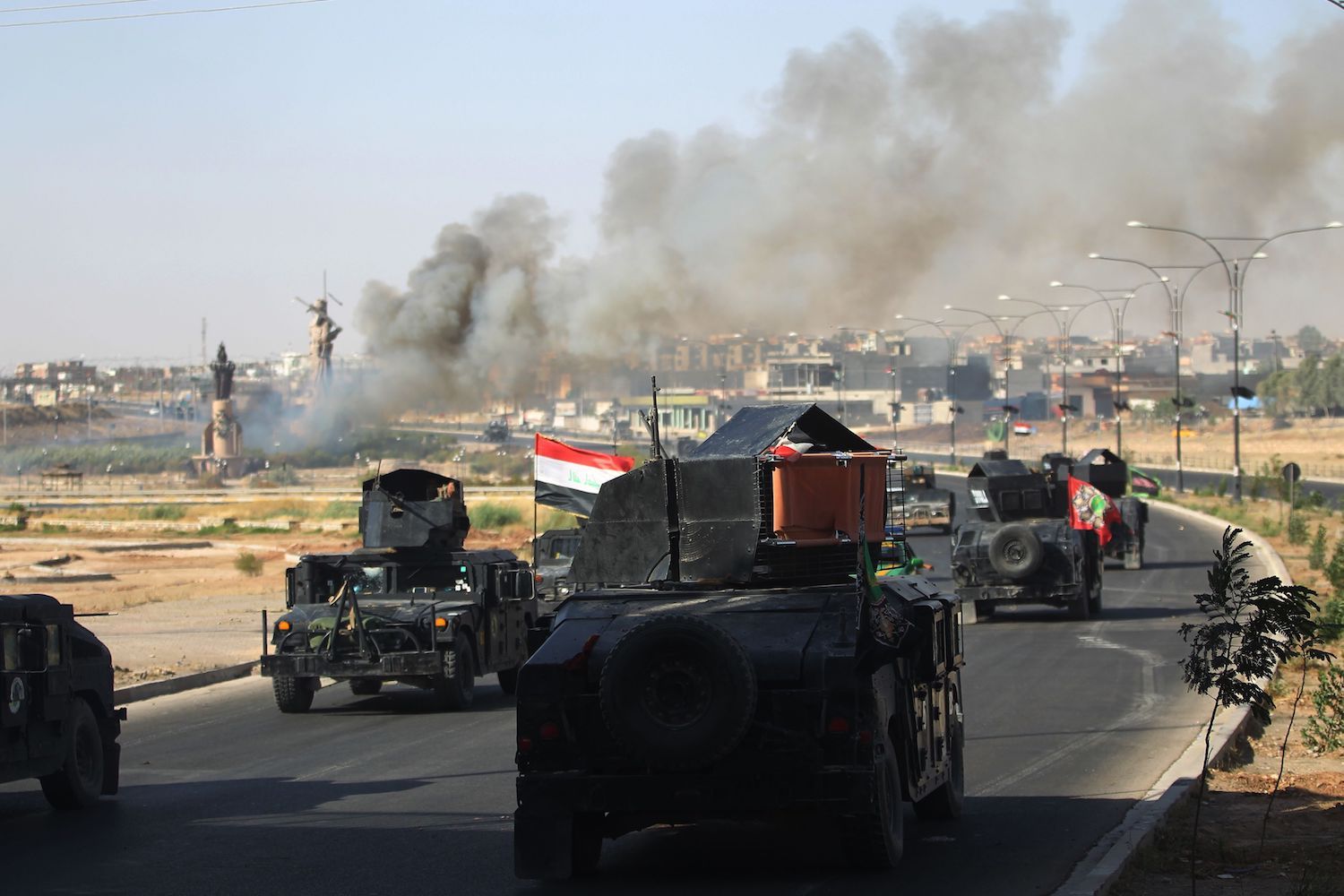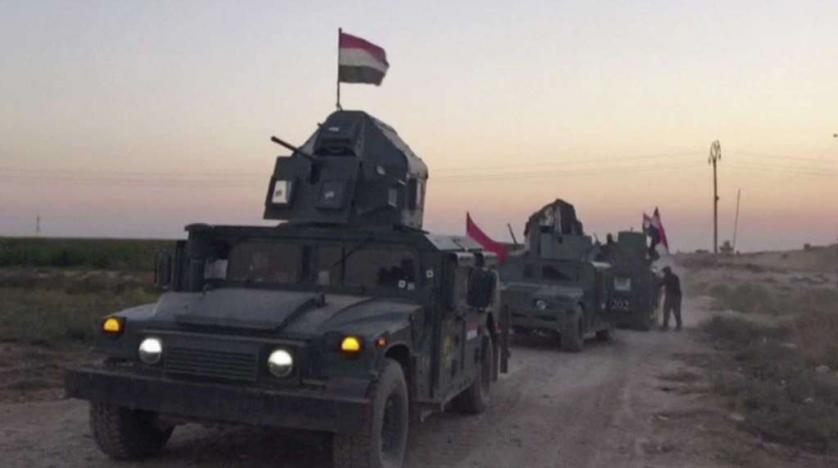
On Tuesday, the Iraqi government troops have retaken the oil-rich northern Iraqi province of Kirkuk from the Kurds who had controlled the province since June 2014 when the Islamic State overran Mosul. What exactly transpired is still unclear but the two Iraqi factions of the Kurds, the Erbil-based KDP Kurds and the Suleimaniyah-based PUK Kurds, are accusing each other of abandoning their positions and leaving the city vulnerable to a takeover by the Iraqi troops.
The causes of the defeat of well-armed and well-trained Kurdish Peshmerga militia at the hands of Iraqi government troops and allied Shi’a militias will come to light in due time, but what we now know for sure is that Masoud Barzani’s referendum for independence gambit has dismally backfired on the Kurds.
In order to understand the Kurdish factor in the Syria-Iraq equation, bear in mind that there are four distinct types of Kurds: first, the Kurdistan Democratic Party (KDP) Kurds of Iraq led by Masoud Barzani; second, the Patriotic Union of Kurdistan (PUK) Kurds of Iraq who were led by Iraq’s late president Jalal Talabani; third, the PKK Kurds of Turkey; and fourth, the PYD/YPG Kurds of Syria.
The Barzani-led KDP Kurds of Iraq have traditionally been Western allies who have formed a strategic alliance with the US and Israel since the 1990s during the First Gulf War. All other Kurds, however, have traditionally been in the anticolonial socialist camp and that’s the reason why PKK has been designated a “terrorist organization” by NATO because Turkey has the second largest army in NATO and it views the separatist Kurds in Turkey’s southeast with suspicion.
Unlike the Barzani-led Kurds of Iraq, however, the PYD/YPG Kurds of Syria, who are ideologically akin to the socialist PKK Kurds of Turkey, had initially formed an alliance with the pro-Russia Assad regime against the Sunni Arab militants in return for limited autonomy; the aforementioned alliance, however, was not just against the Islamic State but against all the Sunni Arab jihadist groups operating in Syria, some of which have been supported by NATO and the Gulf Arab states.
It was only in August 2014, after Washington’s declaration of war against the Islamic State, that the PYD/YPG Kurds of Syria switched sides and now they are the centerpiece of the US policy for defeating the Islamic State in the region. One can’t really blame the Kurds for this perfidy because they are fighting for their right of self-determination, but once again the Western powers have executed their tried-and-tested divide-and-rule policy to perfection in Syria and Iraq to gain leverage and to turn the tide despite the dismal failure of their stated policy of “regime change” for the initial three years of the Syrian civil war from August 2011 to August 2014.
Until August 2014, the declared US policy in Syria was “regime change” and the PYD/YPG Kurds of Syria had formed a defensive alliance with the Assad regime against the Sunni jihadists to defend the semi-autonomous Kurdish majority areas in Syrian Rojava; that equation changed, however, when the Islamic State captured Mosul in June 2014 and also threatened Washington’s most steadfast ally in the region Masoud Barzani and his capital Erbil in the Iraqi Kurdistan, which is also the hub of Big Oil’s Northern Iraq operations. After that development, the United States made an about-face on its “regime policy” in Syria and now the declared objective became the war against the Islamic State.
That policy reversal in turn led to a reconfiguration of alliances among the regional players and the PYD/YPG Kurds broke off their previous arrangement with Assad regime and formed a new alliance with Washington against the Islamic State. Unlike their previous defensive alliance with the Syrian regime, however, whose objective was to protect and defend the Kurdish majority areas in Syria from the onslaught of the Sunni Arab jihadists, this new Kurdish alliance with Washington is more aggressive and expansionist, and its outcome is obvious from the October 2015 Amnesty International report on the forced displacement of Arabs and demographic change by the Kurds in Iraq and Syria.
Regarding the three-way ethno-sectarian conflict between the Sunni Arab militants, the Shi’a-dominated governments and the Sunni Kurds in Syria and Iraq, according to reports, the government-allied militias in Syria and Iraq are comprised of local volunteers as well as Shi’a foreign fighters from Lebanon, Iran and even the Hazara Shi’as from as far away as Afghanistan and Pakistan.
And similarly, Sunni jihadists from all over the region have also been flocking to the battlefield in Syria and Iraq for the last several years. A full-scale Sunni-Shi’a war has been going on in Syria, Iraq and Yemen which will obviously have its repercussions all over the Islamic World where Sunni and Shi’a Muslims have coexisted in relative peace for centuries.
Moreover, unlike al Qaeda, which is a terrorist organization that generally employs anticolonial and anti-Zionist rhetoric to draw funds and followers, the Islamic State and the majority of Sunni Arab militant groups operating in Syria are basically anti-Shi’a sectarian outfits. By the designation “terrorism,” it is generally implied and understood that an organization which has the intentions and capability of carrying out acts of terrorism on the Western soil.
Although the Islamic State has carried out a few acts of terrorism against the Western countries, but if we look at the pattern of its subversive activities, especially in the Middle East, it generally targets the Shi’a Muslims in Syria and Iraq. A few acts of terrorism that it has carried out in the Gulf Arab states were also directed against the Shi’a Muslims in the Eastern province of Saudi Arabia and Shi’a mosques in Yemen and Kuwait.
Regarding the Syrian opposition, a small fraction of it has been comprised of defected Syrian soldiers who go by the name of Free Syria Army, but the vast majority has been comprised of Sunni Arab jihadists and armed tribesmen who have been generously funded, trained, armed and internationally legitimized by their regional and international patrons.
The Islamic State is nothing more than one of numerous Syrian militant outfits, others being: al-Nusra Front, Ahrar al-Sham, al-Tawhid brigade, Jaysh al Islam etc. All the Sunni Arab militant groups that are operating in Syria are just as fanatical and brutal as the Islamic State. The only feature that differentiates the Islamic State from the rest is that it is more ideological and independent-minded.
The reason why the US has turned against the Islamic State is that all other Syrian militant outfits only have local ambitions that are limited to fighting the Assad regime in Syria, while the Islamic State has established a global network of transnational terrorists that includes hundreds of Western citizens who have become a national security risk to the Western countries.
Finally, regarding the much-touted “liberation” of the Islamic State’s de facto capital, Raqqa, by the US-backed and Kurdish-led Syrian Democratic Forces (SDF), according to a recent report by a humanitarian initiative REACH, only a few thousand residents have remained in Raqqa from a prewar population of more than 300,000. Since January, the US has bombed the city so heavily that not a single building has remained intact.
Thus, though the US might have comprehensively defeated the Islamic State, but as far as the people of Syria and Iraq are concerned, the US has not liberated the cities inhabited by people; rather, it has “liberated” the rubble of the cities of Mosul and Raqqa that once were hustling, bustling cities and had a history and heritage to rival Cairo and Istanbul.
Nauman Sadiq is an Islamabad-based attorney, columnist and geopolitical analyst focused on the politics of Af-Pak and Middle East regions, neocolonialism and petro-imperialism.










































